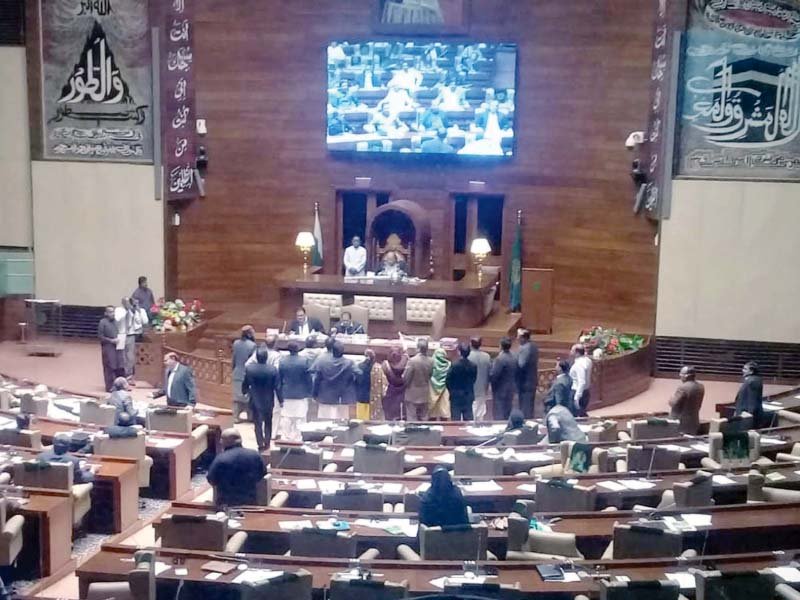
The amendment was made to the Sindh Local Government Act, 2013, which had earlier stipulated that these local bodies' representatives would be removed by a two-thirds majority.
The assembly floor witnessed scenes of chaos as the bill was introduced, with the opposition members shouting slogans of "shame, shame; no, no and go, go".
Opposition walkout
Opposition leader Firdous Shamim Naqvi, pointing a finger at the speaker, Agha Siraj Durrani, said they had serious reservations about the amendment.
Nevertheless, Durrani asked the Local Government (LG) minister Saeed Ghani to move a bill on these amendments. "You can oppose it if you have reservations," the speaker told the Opposition lawmakers.
Sindh govt has three weeks to assess civic agencies’ structure
Subsequently, the Opposition members, belonging to the Pakistan Tehreek-i-Insaf (PTI), Muttahida Qaumi Movement-Pakistan (MQM-P) and the Grand Democratic Alliance (GDA) stood up at their seats to protest and walked out of the session.
As they left the House, the LG minister moved the amendments and the bill was passed by the Assembly. Two lawmakers from Muttahida Majlis-e-Amal (MMA) and the Tehreek-e-Labbaik Pakistan (TLP) who sit on the Opposition benches, did not partake in the protest and supported the legislation.
Moving the amendment, Ghani referred to Section 27 of the LG Act, 2013. "When the prime minister and speakers can be removed by a simple majority, then why not elected representatives of local bodies," he said, adding that they had no intention to take action and victimise anyone, but had made the amendment in view of the Elections Act, 2017.
"Certain amendments must be carried out for the sake of bringing uniformity amongst the aforesaid Acts, enabling the Election Commission of Pakistan to conduct free, fair and transparent elections."
Equal votes
Another amendment moved to the law relating to candidates who contest LG elections and get equal votes. The amendment states: "In case of election to any council, there is equality of votes between contesting candidates, the election tribunal shall declare both the candidates as member of the concerned council.
Each of them shall be entitled to represent the constituency in the council for half of its term of office."
LG minister blames poor performance on NAB
In this regard, the election tribunal will draw a lot to determine who shall serve as member of the council for the first half of its term.
In case there is equality of votes among more than two contesting candidates at the conclusion of counting, the election tribunal shall order fresh elections in the constituency within 60 days from the date of its order.
Another amendment to Section 58 of the LG Act was about action to be taken against those who force voters to cast votes and use derogatory language against the army. "A person will be guilty if he compels any person to vote or refrain from voting, or offers himself as a candidate or forces someone to withdraw his candidature, issues threats, uses derogatory language against any saints, threatens to give a religious sentence and maligns the armed forces of Pakistan.
The Sindh government also amended Section 38 of the LG law. The amendment says that "after the election program has been issued and till the publication of names of candidates in the official gazette, the government or any other authority shall not post or transfer any officer appointed without prior approval of the ECP".
Call-attention notices
Earlier, as the session started, GDA's Nusrat Seher Abbasi in her call-attention notice criticised the Sindh Higher Education Commission, which according to her was non-functional for the last five years. "You established your own higher education commission in 2013 by making a law on it," she remarked. "As per law, the officials including secretary are to be appointed by the commission itself. But this never happened," she said, adding that the chief minister had appointed people in violation of the rules and laws.
"A lecturer and an official of the Karachi Metropolitan Corporation have been appointed deputy directors. They have no any experience of higher education. How do you appoint these people on deputation in violation of the apex court's orders," she asked, adding that millions of rupees of funds had been allocated for research and scholarship, but the funds were not utilised. "If you are unwilling to work, why was the commission set up in the province?" she said.
Sindh Education Minister Syed Sardar Ahmed, on behalf of the chief minister responded to the criticism, saying all 15 members and the chairperson of the higher commission were appointed on merit and it worked diligently.
"The Sindh Higher Education Commission is fully functional. It monitors the performance of universities, ensures the quality of education is maintained and is accrediting higher education institutions in Sindh."
Arif Mustafa Jatoi, in his call-attention notice, inquired about the Rs4 billion allocated for the revival of "sick industries" in the province. Referring to the JIT report, he said, "Around Rs3.7 billion have been embezzled and the funds have been given to three sugar industries which are almost non-functional."
Minister for parliamentary affairs, excise and taxation, Mukesh Kumar Chawla, suggested Jatoi to do his homework before raising issues. "FIA, in its report, has said that the industries ministry had not released funds for sick industries." He denied the allegations. The speaker subsequently adjourned the session till today [Thursday].
Published in The Express Tribune, January 24th, 2019.

















COMMENTS
Comments are moderated and generally will be posted if they are on-topic and not abusive.
For more information, please see our Comments FAQ